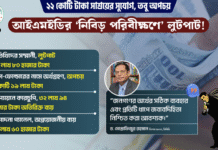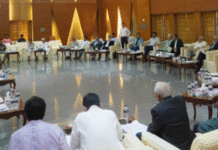The illegal immigrants are growing much faster than the Bangladesh average
The government has imposed a ban on marriage between Bangladeshis and Rohingyas – Muslim refugees from neighbouring Myanmar – to address the threat of an increasing population of the intruders.
The registration directorate under the Law Ministry yesterday issued a circular imposing the ban on registering such marriages terming Rohingyas “non-Bangladeshi nationals.”
The circular said: “Punitive actions will be taken against those marriage registrars who will register the marriage of any Rohingya in Bangladesh.”
The ban follows a proposal placed by Cox’s Bazar district administration a couple of months ago.
“We floated the idea at the Cabinet Division so that it is raised and discussed in the [ongoing] DC [deputy commissioner] conference in Dhaka,” Cox’s Bazar DC Ruhul Amin told the Dhaka Tribune over phone.
He said the move against marriage between Bangladeshis and Rohingyas came in the backdrop of rising threat of an increasing Rohingya population.
The ban on such marriages will be applicable for both types of Rohingyas in Bangladesh – those who live in the registered refugee camps and those living outside the camps as illegal immigrants.
“This move is meant to stop a Rohingya influx from Myanmar into Bangladesh and also to check their strategy of becoming permanent residents or citizens of Bangladesh by such marriages,” said DC Ruhul.
The climbing number of Rohingya population over the last couple of decades or so, especially in Cox’s Bazar, Chittagong and the three hill districts, has emerged as a growing concern for the country.
Bangladesh now officially accommodates 32,355 Rohingya refugees in two registered camps in Cox’s Bazar.
However, different local estimates put the number at 3-5 lakh, most of whom live illegally in and around the Cox’s Bazar area.
In 2004, unofficial estimates suggested that the number was around 2 lakh. Since then, the number has been gradually increasing with hundreds of Rohingyas fleeing Myanmar in small groups and illegally entering Bangladesh every month.
Population growth rate and the family size of the Rohingya refugees are much higher than those of the Bangladeshis.
According to the 2011 census, the average family size in the country is 4.4. But local officials say the figure is over 8 in the Rohingya refugee camps. Bangladesh’s population growth rate is 1.34%; but the Rohingyas are growing at about 4% annually.
Traditionally, Rohingyas have illegally entered Bangladesh mainly to avoid repression by the government and sectarian clashes.
However, poverty has also emerged as a major reason why they seek to come to Bangladesh, thanks mainly to poor guarding by the Bangladeshi border security force, local residents say.
Bangladesh experienced the first spike in Rohingya intrusion 1978 followed by another in 1991; since then, the intrusion has become common in Teknaf of Cox’s Bazar.
On those two occasions, Bangladesh opened the doors on humanitarian grounds to thousands of Rohingya refugees, who fled their homes to avoid sectarian clashes, and gave them shelter in camps in Cox’s Bazar.
Till date, two such camps exist in Teknaf and Cox’s Bazar, where more than 32,000 refugees live, according to a recent survey jointly conducted by the government and the UNHCR.
The surveyors found that 30-35 refugees – both male and female – were married to Bangladeshis. These couples have around 70-80 children, said Farid Ahmed Bhuiyan, Rohingya refugee repatriation commissioner (RRRC) in Cox’s Bazar.
He said the registered Rohingyas had the mandate to marry someone from their camps.
The RRRC office recently sent information about these 35 Rohingya-Bangladeshi families to the Home Ministry, asking the authorities to decide on the status of their children in line with existing laws on nationality and citizenship, Farid said.
He also said the repatriation of Rohingya refugees had remained stalled since July 2005. “The huge number of undocumented Rohingyas is a huge burden for densely populated Bangladesh.”
The RRRC said the rise in the number of Rohingyas was alarming and the government had been planning to conduct a survey to know the actual number of undocumented Rohingyas.
“They are citizens of Myanmar. They all should be repatriated to Myanmar honourably,” Farid said. “We have been asking all to think about how they can be repatriated instead of thinking about integrating them with Bangladesh.”
Cox’s Bazar DC Ruhul said: “If someone go to a country, they need documents such as passport and visa. But Rohingyas are coming to Bangladesh without any paper, they are marrying Bangladeshi citizens and getting permanent citizenship.
“When a Rohingya gets married to a Bangladeshi, he or she becomes a voter by obtaining a national identity card. They then bring in their neighbours and relatives from Myanmar who again follow the same strategy to become permanent citizens here,” the DC said. “This has to be stopped.”
Yesterday’s circular, banning the cross marriages, also said registrars were appointed according to existing laws to timber the union of Bangladeshi nationals. They have neither the right nor the authority to register the marriage of any non-Bangladeshi national.
Law Minister Anisul Haque told the Dhaka Tribune that the marriage registrars’ work fell under his ministry. “We have instructed them to abstain from documenting Rohingya marriages. We will take steps against them if they violate the instruction of the legal authority.”
He also said the procedure for registering the marriage of a citizen of any other country is different from that for registering the marriage of a Bangladeshi.
“It is all right if they follow the internationally accredited procedure. We have nothing to say. But restrictions will be applicable if they register the marriage of a Rohingya in ways similar to those followed for registering the marriage of a Bangladeshi,” the minister said.
The registration of such marriages would be cancelled automatically if it could be proved that they were not Bangladeshis.
At the DC conference yesterday, the law minister asked the deputy commissioners to stop Rohingya refugees marrying as Bangladeshi nationals. The registrars were also instructed to refrain from the practice.
Asked what would happen to the Rohingyas, who are already married to Bangladeshi citizens, Cox’s Bazar DC Ruhul said the matter would be discussed and decided on later.
He also said: “If we get any complaint that a Rohingya has married a Bangladeshi citizen claiming
themselves as a Bangladeshi citizen, we will take legal steps if we get proofs.”
The Cox’s Bazar district administration has held meetings with the BGB and police and have all adopted a “zero tolerance” policy to deal with the intrusions, the DC said.
Source: Dhaka Tribune









